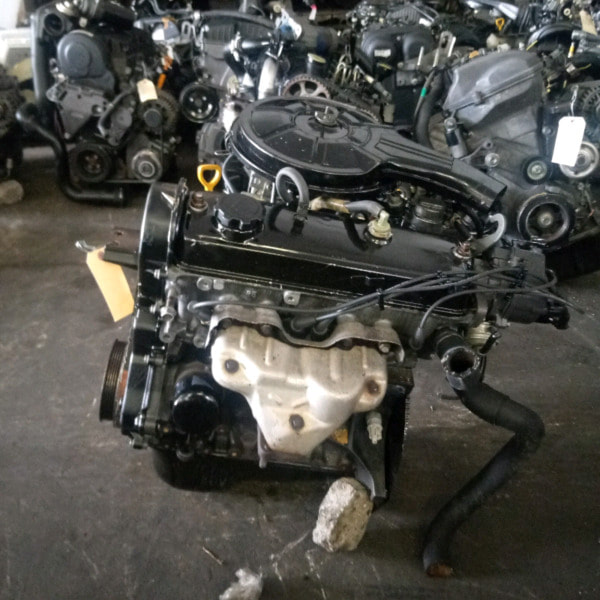Open Efficiency: Toyota Tazz Engine for Sale at Affordable Rates
Open Efficiency: Toyota Tazz Engine for Sale at Affordable Rates
Blog Article
Smart Purchaser's Checklist: Key Includes to Review in Engines Prior To Making an Acquisition
When taking into consideration acquiring an engine, there are numerous crucial functions that a discerning customer need to review to ensure they are making a knowledgeable decision. From the type of engine to its efficiency metrics, gas performance, maintenance, and resilience costs, each facet plays an important duty in figuring out the engine's viability for the designated objective. By thoroughly checking out these aspects, buyers can purchase that not only satisfies their existing requirements yet also verifies to be a sensible long-term financial investment.
Engine Kind Assessment

When examining engine types for an acquisition, it is essential to take into consideration the certain requirements of the desired application. Different engines are made with varying features and capacities to fit a series of needs. Comprehending the key function for which the engine will certainly be used is essential in making a notified decision.
For applications requiring high power output, such as heavy-duty commercial machinery or big cars, diesel engines are commonly preferred because of their performance and torque capabilities. On the other hand, gas engines are generally chosen for smaller devices, lorries, and power tools where lighter weight and higher RPM performance are beneficial.
Furthermore, the atmosphere in which the engine will certainly run need to be thought about (Toyota Tazz Engine For Sale). Variables such as elevation, temperature level, and air high quality can affect the engine's performance and longevity. Selecting an engine type that is suitable for the specific operating problems will certainly assist make sure ideal effectiveness and toughness
Efficiency Metrics Evaluation

Gas Efficiency Exam
Evaluating fuel performance is an essential factor in figuring out the functional cost-effectiveness and environmental effect of an engine. Gas efficiency refers to the quantity of power an engine can extract from a certain amount of gas. It straight affects the general operating expenditures of the engine, making it a vital factor to consider for customers looking to enhance their long-lasting prices.
When evaluating fuel efficiency, it is important to take into consideration metrics such as miles per gallon (MPG) or litres per 100 kilometers (L/100km) depending on the region. These metrics offer a clear indicator of exactly how much a lorry can travel on an unit of fuel, enabling purchasers to approximate fuel expenses precisely. In addition, modern technologies like crossbreed systems, turbocharging, and straight gas shot can dramatically influence fuel efficiency by improving burning performance and reducing power losses.

Toughness and Reliability Check
Taking into consideration the significant influence of fuel efficiency on operational prices and ecological sustainability, the next important aspect to examine in engine purchase is the toughness and integrity of the engine. Resilience describes the engine's ability to stand up to wear, deterioration, and stress over an extensive duration, ensuring a longer life expectancy. Dependability, on the other hand, refers to the engine's uniformity in performance under numerous conditions without unexpected failures or failures.
To assess the toughness and reliability of an engine, a number of variables require factor to consider. First, examining the engine's construction materials and style can offer understanding into its robustness and resistance to put on. Additionally, reviewing historic data on the engine design's performance, upkeep requirements, and usual issues reported by customers can help determine its dependability.
Furthermore, accreditations from trusted companies, guarantee offerings, and supplier credibility for generating reliable engines are beneficial signs of durability and dependability. Performing comprehensive study, seeking suggestions, and evaluating maintenance records can assist in making an informed decision on acquiring an engine known for its durability and dependable performance.
Price and Upkeep Considerations
When pondering engine acquisition decisions, a necessary element to dive right into is the financial ramifications combined with upkeep considerations. The cost of an engine prolongs past the first acquisition cost. It is crucial to evaluate elements such as gas performance, recurring upkeep prices, and the availability of spare parts. Selecting a fuel-efficient engine may lead to long-lasting expense financial savings regardless of a possibly greater ahead of time rate. In addition, evaluating the maintenance requirements of different engine models is view it now vital. Some engines may necessitate constant maintenance or specialized treatment, bring about raised upkeep expenditures gradually. Thinking about the accessibility and cost of spare parts is likewise paramount. Engines with conveniently available and reasonably valued extra components can dramatically reduce upkeep prices and downtime. Focusing on cost-effectiveness and simplicity of maintenance can result in an extra economical and sustainable engine investment in the future.
Conclusion
In verdict, it is vital for buyers to extensively assess key functions in engines before making an acquisition. By considering the engine kind, performance metrics, gas effectiveness, sturdiness, maintenance, integrity, and cost demands, customers can make an informed choice that fulfills their assumptions and needs. This extensive analysis process makes sure that anonymous customers select an engine that will supply optimum performance and durability for their planned usage.
From the type of engine to its performance metrics, fuel resilience, effectiveness, and upkeep expenses, each element plays a crucial duty in determining the engine's suitability for the intended purpose. Gas performance is a critical performance metric, highlighting how effectively the engine converts fuel right into useful power - Toyota Tazz Engine For Sale. Gas performance refers to the quantity of energy an engine can draw out from a specific quantity of fuel.Considering the significant influence of gas performance on functional expenses and environmental sustainability, the next crucial facet to review in engine acquisition is the toughness and dependability of look here the engine. By thinking about the engine type, performance metrics, gas effectiveness, sturdiness, dependability, cost, and upkeep requirements, customers can make an enlightened decision that meets their assumptions and requirements
Report this page